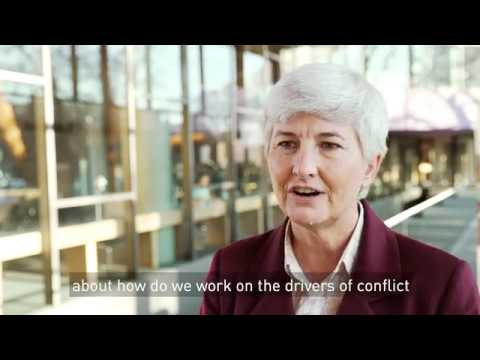What is the position of the FAO regarding climate security risks? What are they doing to integrate both in their activities? What needs to be done to make food systems resilient?
This interview was conducted at the Planetary Security Conference in The Hague, 5-6 December 2016. It is produced by Paul Müller-Hahl (Lichtbilder Filmproduktion) and directed by Stella Schaller (adelphi).
"Our view on these things, of course, is that the stressors of climate change present both a challenge for food security - we are very concerned that it can act, at the worst end, as a conflict multiplier - but also represents an opportunity. I think to have debates about how to get the broader system involved and how to manage these risks. And we have a very unhelpful bifurcation between the humanitarian management of humanitarian crises and what the larger dimensions of risk and vulnerability are that are implicit in the climate, food security, environment nexus. So we would do our best to try and use these opportunities to think about what are the means as an institution, about how do we work on the drivers of conflict as they may relate to land tenure, degradation of ecosystems – what they mean for the institutions that are often our counterparts in government for example.
How do we work in conflict context in order to keep production going – herders, pastoralists, fisher folk – as well as to be able to secure those food systems to cities? And then, lastly, how do we advance the sustainable development goals even in this complicated nexus? And so the whole of FAO, I would say, using a range of our competences, are currently focused on this. It is a bit of a scary time for sure because of the incredible depth of vulnerability that the world is facing now and the forecasts but it is also quite exciting.
Actually right now I think we are focused on a couple of specific areas. One is the centrality of resilience. It has been quite exciting to see what has been a notion that has been hanging around in a specialized community get such incredible prominence and taken seriously to really look at what do we need to do with policies, institutions, and processes in order to create a more resilient environment for food producers and consumers world-wide for food security and nutrition – that is one aspect.
And secondly is: How do we reform our ways? We can no longer think that climate is one issue and conflict is another issue where we can afford to have different parts of the institution working on these. But how do you come together and think in terms of more of a holistic system approach? How do you use the wide range of resources that you have: humanitarian, investment, political, strategic, development in order to work across from extreme food insecurity all the way up to the most resilient of food systems?"










